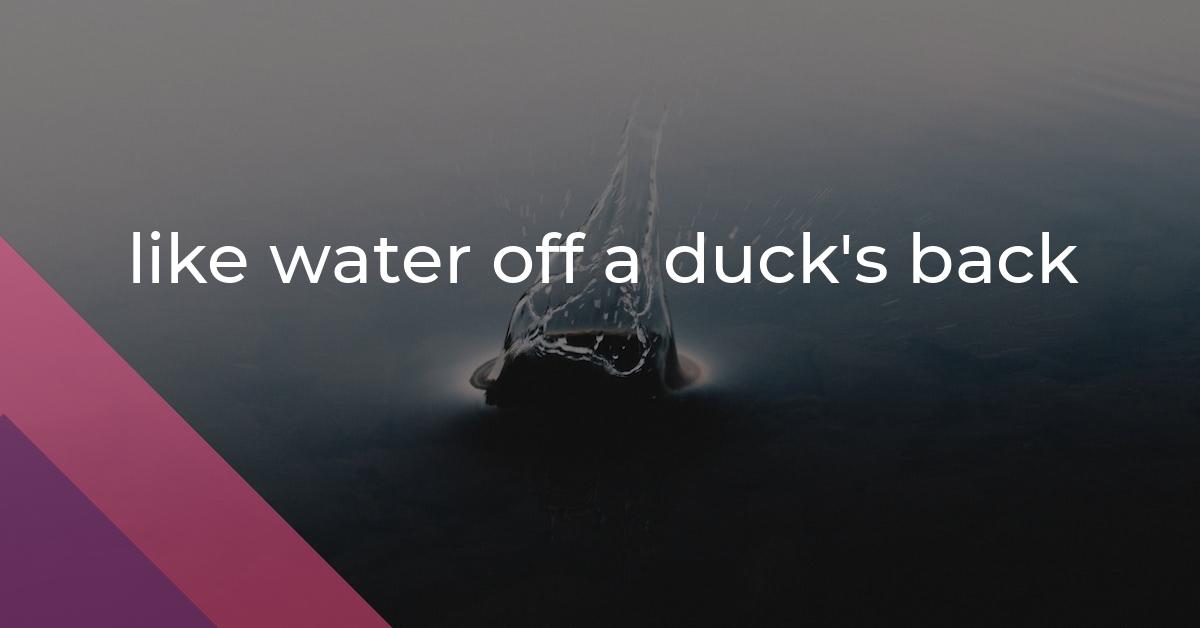like water off a duck’s back: Idiom Meaning and Origin
What does ‘like water off a duck's back’ mean?
The idiom "like water off a duck's back" means that something does not bother or impact someone at all.

Idiom Explorer
The idiom "water under the bridge" means that something has happened in the past and is no longer important or relevant in the present.
The idiom "rest easy" means to feel calm, relaxed, and free from worry or anxiety. It implies a sense of trust or confidence that everything is under control and there is no immediate cause for concern.
The idiom "much ado about nothing" means making a fuss or creating a big deal out of something that is unimportant or insignificant.
This idiom means to exaggerate or make something seem more serious or important than it really is.
The idiom "magic bullet" means a simple and effective solution to a difficult problem or challenge.
The idiom "made in the shade" means to be in a position of ease, comfort, or advantage. It suggests that everything is going well and requires little effort or worry.
The idiom "lucky duckling" refers to someone who is fortunate or has good luck. It is often used to describe someone who finds success or achieves something positive unexpectedly or easily.
The idiom "luck out" means to have good luck or be fortunate in a particular situation.
The idiom "look the other way" means to purposefully ignore or pretend not to notice something that is wrong or improper. It is often used when someone wants to avoid taking action or becoming involved in a potentially difficult or uncomfortable situation.
The idiom "look like" means to resemble or have a similar appearance to something or someone.
Resilience Revealed
The idiom "like water off a duck's back" is a phrase used to describe a situation or event that has little or no effect on someone. It suggests that negative comments or criticism directed towards a person or situation are easily disregarded or ignored. This idiom is often used to express resilience or the ability to remain unaffected by negative or critical remarks.
The origins of this idiom can be traced back to the behavior of ducks and their unique waterproof feathers. Ducks have a gland near the base of their tails that produces an oily substance called preen oil. They spread this oil across their feathers using their beaks, which makes their plumage tightly knit and waterproof. When water comes into contact with the duck's feathers, it forms into droplets and slides off easily, leaving the duck dry and unaffected by the water.
The metaphorical use of this idiom emerged in the English language during the early 19th century. It is believed to have originated from the observation of the physical behavior of ducks and their ability to repel water. The phrase gained popularity due to its vivid imagery and relatable concept, resonating with people facing criticism or adversity in various situations.
Another related idiom is "like a duck to water". This phrase describes someone who can easily and naturally adapt to a new situation or skill. Just as a duck takes to water instinctively, this idiom implies that the person quickly becomes comfortable and proficient in their new environment or task.
Similarly, the idiom "like a duck takes to water" also refers to someone who effortlessly and immediately adapts to a situation. It emphasizes the ease and fluency with which the person acclimates to their surroundings, much like a duck taking to water without hesitation or difficulty.
"Like water off a duck's back" has become a widely recognized and frequently used idiom, employed in everyday conversations, literature, and media. It highlights the notion of resilience, indifference, or the ability to remain unaffected by negative circumstances. The idiom has endured over time, emphasizing the universal human experience of facing criticism or unfavorable situations.
While the idiom itself is well understood and consistently used, its precise origins beyond the metaphorical interpretation are challenging to trace definitively. The metaphorical connection between the behavior of water sliding off a duck's back and the ability to remain unaffected by criticism has created a lasting impression in the English language and cultural understanding. The idiom not only embodies the human desire to deflect negativity but also provides a sense of optimism and self-assurance in the face of adversity.
Example usage
Examples of how the idiom "like water off a duck's back" can be used in sentences:
1. Despite the criticism, Jane remained unfazed and it was all like water off a duck's back to her.
2. The negative comments seemed to have no effect on Tom; they just rolled off him like water off a duck's back.
3. No matter how many setbacks he faced, John always bounced back quickly as if they were like water off a duck's back.
More "Resilience" idioms



